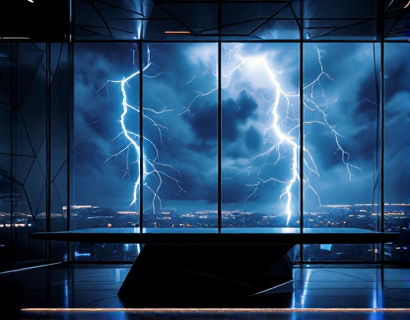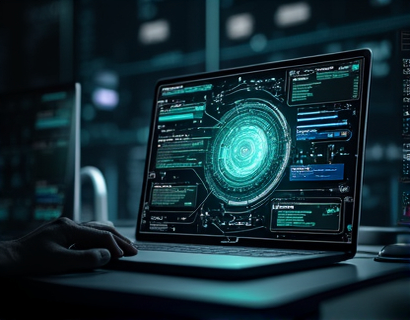Blockchain-Powered Notarization: Revolutionizing Document Security and Accessibility with Decentralized Trust
In an era where digital transformation is reshaping industries, the need for secure, efficient, and transparent document notarization has become paramount. Traditional notarization processes, while trusted, are often cumbersome, time-consuming, and prone to errors. Blockchain-powered notarization emerges as a groundbreaking solution, leveraging the inherent properties of blockchain technology to revolutionize document security and accessibility. This article delves into the transformative impact of blockchain-driven notarization, exploring its benefits, mechanisms, and the future it promises for legal professionals and businesses.
Understanding Blockchain Technology
Before diving into the specifics of blockchain-powered notarization, it's essential to grasp the fundamentals of blockchain technology. At its core, a blockchain is a decentralized digital ledger that records transactions across multiple computers in such a way that the registered transactions cannot be altered retroactively. This technology ensures transparency, immutability, and security, making it an ideal foundation for notarization services.
Blockchain's decentralized nature means there is no single point of failure or control, reducing the risk of tampering and fraud. Each block in the chain contains a cryptographic hash of the previous block, a timestamp, and transaction data. This interlinking creates an unbreakable chain, ensuring that any attempt to alter a block would require changing all subsequent blocks, a task that is computationally infeasible.
Enhancing Document Security
One of the primary advantages of blockchain-powered notarization is the significant enhancement in document security. Traditional notarization relies on physical documents and manual processes, which are vulnerable to loss, damage, and unauthorized access. In contrast, blockchain-based notarization digitizes documents and stores them in a secure, tamper-evident ledger.
The cryptographic techniques employed in blockchain ensure that documents are encrypted and can only be accessed by authorized parties. Each document is assigned a unique digital signature, which verifies its authenticity and integrity. Any attempt to modify the document would result in a change to its hash, immediately alerting all parties to the tampering attempt.
Moreover, blockchain's immutability ensures that once a document is notarized, its contents cannot be altered without detection. This feature is particularly crucial for legal documents, contracts, and official records where the integrity of the document is paramount. The decentralized nature of the ledger also means that multiple copies of the document exist across the network, reducing the risk of data loss.
Ensuring Authenticity and Verifiability
Authenticity and verifiability are cornerstones of any notarization process. Blockchain-powered notarization excels in these areas by providing a verifiable and auditable trail of document transactions. Each notarization event is recorded on the blockchain, creating a permanent and transparent history that can be accessed and verified by all stakeholders.
The use of smart contracts further enhances this process. Smart contracts are self-executing contracts with the terms of the agreement directly written into code. They automate the notarization process, ensuring that all conditions for notarization are met before the document is recorded on the blockchain. This automation reduces the potential for human error and increases the speed of the notarization process.
Stakeholders can verify the authenticity of a document by checking its hash on the blockchain. This process confirms that the document has not been altered since its notarization and that it was indeed notarized by an authorized entity. The transparency of the blockchain ledger allows for real-time verification, building trust among parties and reducing disputes.
Improving Accessibility and Efficiency
Blockchain-powered notarization significantly improves the accessibility and efficiency of document authentication. Traditional notarization often requires physical presence, lengthy processing times, and intermediaries such as notaries and legal offices. In contrast, blockchain-based notarization is fully digital and can be accessed from anywhere with an internet connection.
This digital approach eliminates the need for physical document transmission, reducing costs and time associated with mailing and courier services. Notarization can be performed instantly, with documents being verified and recorded on the blockchain within minutes. This speed is particularly beneficial for cross-border transactions and international business operations, where time zones and geographical distances can pose significant challenges.
Furthermore, the decentralized nature of blockchain reduces the dependency on centralized authorities, streamlining the notarization process. Users can interact directly with the blockchain network, bypassing intermediaries and reducing administrative overhead. This direct interaction not only speeds up the process but also lowers costs, making notarization more accessible to a broader range of users.
Case Studies and Real-World Applications
Several industries have already begun to adopt blockchain-powered notarization, reaping the benefits of enhanced security, efficiency, and transparency. In the real estate sector, for instance, property transactions involve numerous documents that need to be notarized and recorded. Blockchain-based notarization simplifies this process, ensuring that all documents are securely stored and easily verifiable. This reduces the risk of fraud and accelerates the transaction process, benefiting both buyers and sellers.
In the corporate world, companies often deal with a high volume of legal documents, contracts, and agreements. Blockchain-powered notarization provides a robust solution for managing these documents, ensuring their authenticity and integrity. Legal teams can focus on more strategic tasks, knowing that document verification is handled efficiently and securely.
Another promising application is in the field of intellectual property (IP) protection. Creators and owners of IP can use blockchain-powered notarization to securely record and verify the ownership and authenticity of their works. This not only deters piracy and unauthorized use but also provides a clear and tamper-proof record of ownership, facilitating licensing and royalty payments.
Challenges and Considerations
While the benefits of blockchain-powered notarization are clear, there are several challenges and considerations that need to be addressed for widespread adoption. One of the primary challenges is regulatory compliance. Different jurisdictions have varying laws and regulations regarding digital notarization and blockchain technology. Ensuring that blockchain-based notarization services comply with local and international regulations is crucial for legal validity and acceptance.
Another consideration is the technical expertise required to implement and maintain blockchain systems. Organizations need to invest in training and hiring professionals with the necessary skills to manage blockchain infrastructure. Additionally, interoperability between different blockchain platforms and existing systems can be a hurdle, requiring standardized protocols and interfaces.
Privacy is also a significant concern. While transparency is a strength of blockchain, it can also expose sensitive information if not properly managed. Implementing privacy-preserving techniques, such as zero-knowledge proofs and encrypted storage, is essential to protect sensitive data while maintaining the integrity of the notarization process.
Future Prospects
The future of blockchain-powered notarization looks promising, with ongoing developments poised to address current challenges and expand its applications. As blockchain technology matures, we can expect improvements in scalability, reducing transaction times and costs. Enhanced privacy features and more sophisticated smart contract capabilities will further enhance the utility and appeal of blockchain-based notarization.
Integration with other emerging technologies, such as artificial intelligence and the Internet of Things (IoT), can open new avenues for document authentication and verification. For example, AI can automate the detection of fraudulent documents, while IoT devices can provide real-time verification of physical documents through digital twins stored on the blockchain.
Moreover, the growing awareness of the benefits of blockchain-powered notarization is likely to drive adoption across various sectors. As more organizations recognize the value of decentralized trust and enhanced security, the demand for blockchain-based notarization services will increase, leading to innovation and further improvements in the technology.
Conclusion
Blockchain-powered notarization represents a significant leap forward in document security and accessibility. By leveraging the unique properties of blockchain technology, this innovative approach offers a secure, efficient, and transparent solution for legal professionals and businesses. The enhanced authenticity, verifiability, and accessibility of documents not only streamline processes but also build trust among stakeholders.
While challenges remain, the potential benefits make blockchain-powered notarization a compelling option for the future. As the technology continues to evolve and gain acceptance, it is poised to transform the way we handle document authentication, paving the way for a more secure and efficient digital world.










































